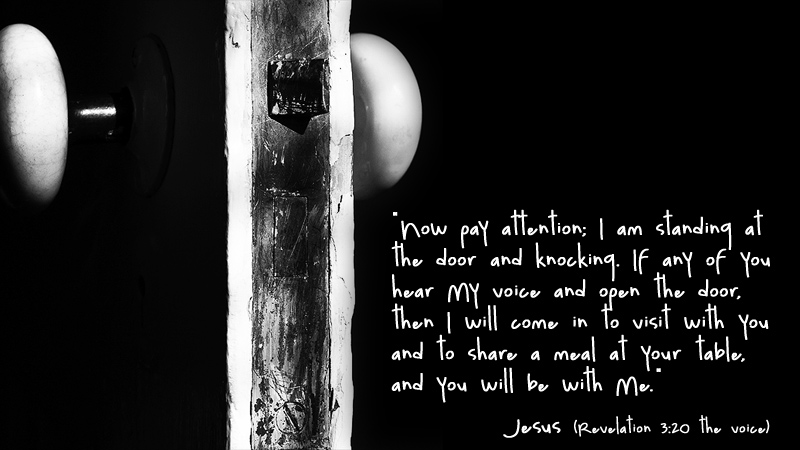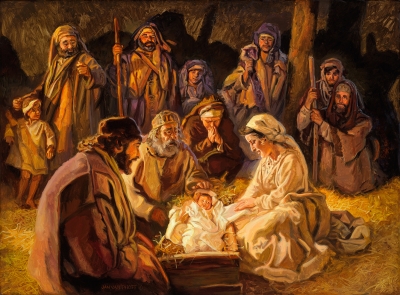Earlier this week I had the great privilege of sharing my faith journey on the worldwide web1, packing 72 years of life into just half-an-hour.
I am especially keen to spread the gospel in this way because the ‘word of our testimony’ – along with the blood of our Saviour – is a vital weapon in overcoming the deepening darkness of our world (Rev 12:11).
And there is something that has come home afresh to me in recent days, as we have started to think about Christmas. It is the awesome reality that the same Spirit who caused the Virgin Mary to be impregnated with the Christ child also brought new birth to me when I invited Jesus into my heart 50 years ago next May.
Jesus born to make his home with us
Christmas is all about how the Creator of the Universe – God himself – took on human flesh and came to live (or tabernacle) with us. And it’s not confined to this time of year, as it happened to me that spring night in 1972. Jesus had been standing at the door of my heart gently knocking for some time. He wasn’t going to kick the door in, but was lovingly trying to get my attention with his friendly wave at the window of my soul.
But when I finally let him in, oh the joy that filled my being! Jesus said: “The thief comes only to steal, and kill, and destroy; I have come that you might have life in all its fullness.” (John 10:10)
Jesus wants to share our lives; he wants to make his home with us.
His promise is that, if we open the door, he will come in and eat with us (Rev 3:20). Sharing a meal was a key part of expressing friendship and hospitality in the ancient Middle East, and still is today. Revelation 3 20, Heartlight.com
Revelation 3 20, Heartlight.com
Jesus wants to share our lives; he wants to make his home with us. This is what the Feast of Tabernacles is all about – being reminded of how God cared for his people in the Wilderness, providing them with manna from heaven and water from the rock. In fact, it is widely believed that Jesus was actually born during this autumn feast.
Born to fulfil the prophets
According to one source2, the reason there was no room at the inn was due, not to the Roman census as we have been led to believe, but because Jerusalem was packed to the rafters with pilgrims for the feast. It is estimated that up to a quarter-of-a-million people would have crowded into the city for the occasion, leaving surrounding towns and villages to take up the slack.
Yes, there was a census3 (or tax), but it was apparently for those who held property, and few people in those days would have owned land far from home. Joseph most probably did, however, since he was a descendant of Ruth and Boaz, who had purchased a field from Naomi – in Bethlehem, just six miles from Jerusalem!
Yet, in spite of Joseph’s royal lineage – Bethlehem was also the city of his ancestor King David – there was no room at the town’s inns (or guest rooms) for his heavily pregnant wife. All of which meant that Israel’s Messiah – the King of the Jews – was born, not in a mansion or palace, but where his bed was a humble manger.
So, whether for tax or census purposes, Caesar was unknowingly doing God’s bidding in order to fulfil what the prophet had foretold – that the Christ would be born in Bethlehem (Micah 5:2), literally ‘House of Bread’. He was given the name Jesus, because he would save his people from their sins, and would also be called Immanuel, which means God with us.
Born so we could be ‘born again’
He came to his own, but his own rejected him (by and large). Yet all who received him became children of God – “born not of natural descent, nor of human decision or a husband’s will, but born of God” (John 1:11-13).
As Jesus later elaborated to Nicodemus, the religious leader, we must be ‘born again’ – not of the flesh, but of the Spirit – in order to see (and understand) the kingdom of God (John 3:3).
Amidst the worldwide shaking caused by the Covid pandemic, there is a kingdom which cannot be shaken.
Christ came as a baby in a manger, but he is coming back as King of Kings when every knee will bow before him. The question of whether we have made room for him in our hearts will be answered on that day, which the Bible refers to as the ‘Day of the Lord’.
Have we allowed him to wash away our sins with the blood of his sacrifice for us on the cross – fulfilling the Jewish Passover when the blood of an unblemished lamb set God’s people free from slavery in Egypt?
Born in us today
Now, for both Jew and Gentile, Jesus sets us free from slavery to sin and the fear of death. I know a Messianic Jewish leader in America who, on this very day (December 17th), is also celebrating 50 years since his Damascus Road experience – except that it was on the New York City subway. His wife has told me that it was a “supernatural, life-changing encounter with the God of Israel”.
Upon hearing the gospel from two Bible School students, he had an open vision showing him that God was speaking to him. “He later heard the audible voice of God commanding him to read the ‘sinners’ prayer’ on the back of a tract. When he did, the Light of God exploded in his spirit and, from that moment, he knew that Jesus/Yeshua really is the Jewish Messiah.”
Amidst the worldwide shaking caused by the Covid pandemic, there is a kingdom which cannot be shaken. As the well-known hymn goes, “When all around is sinking sand, on Christ the solid rock I stand.” And in the words of a famous carol, why not make the following verse a prayer from your heart: “O holy child of Bethlehem, descend to us we pray. Cast out our sin and enter in; Be born in us today.”
Watch here for Kathryn's 60-second Christmas gospel message.
Notes
Charles' new book, To the Jew First, has now been published by Christian Publications International
1Available on YouTube and Facebook at LifeStoriesWorldwide.com
2Rivi Litvin, Hebrew Nuggets, Watch & Pray, The Cedars Community of Prayer and Study, November 2020, quoted in To the Jew First (Christian Publications International), p204
3Some translations (including the Hebrew) render Luke 2:1 as a reference to tax, not census.
